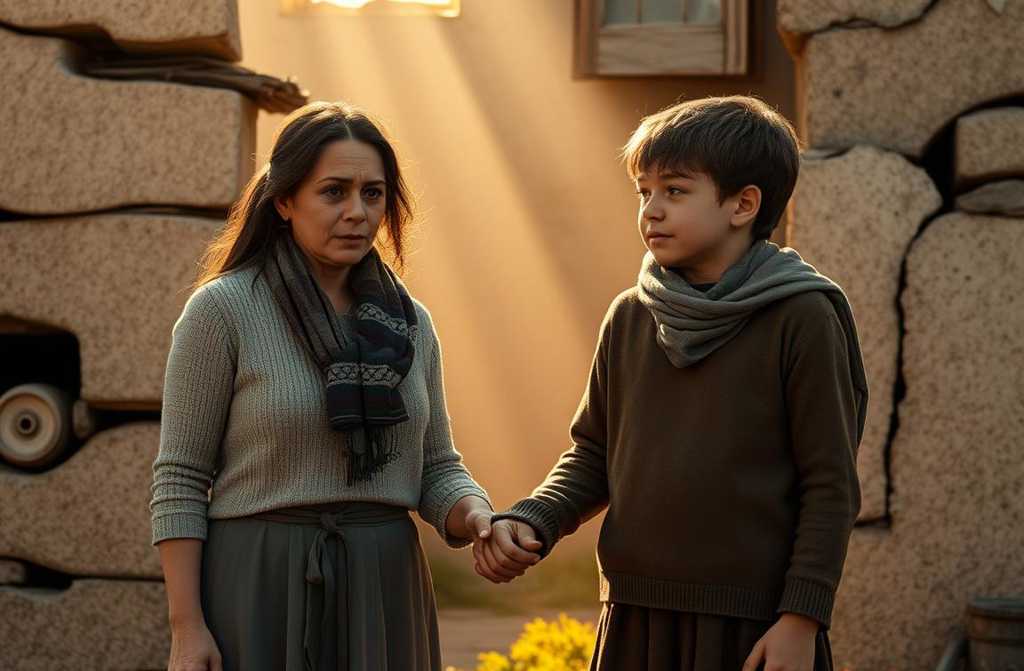My husband left me with our child in his ancient, half-ruined cottage. He had no idea that a secret room full of gold lay hidden beneath its creaking floorboards.
“Do you honestly think this place is fit for a child?” My eyes traced the sagging walls, held together by little more than luck and rusted nails.
“Emily, dont be dramatic. Im leaving you the whole house and the landmore than I had to do,” James said flatly, tossing the last bag onto the splintered porch. His tone carried the irritation of a man forced through an unpleasant chore.
I stared silently at the papers in my hands. The old cottage on the edge of the village, inherited from his grandfather, only mattered now that he wanted us gone. Ten years of marriage ended not with tears, but with a cold transactiona “settlement,” as he called it.
Thomas, my nine-year-old son, stood beside me clutching a threadbare teddy bearthe only toy hed grabbed when his father announced we were leaving. His eyes held the quiet confusion of a child whose world had tilted without explanation.
“Sign here,” James said, handing me a pen with the same indifference as settling a restaurant bill. “No alimony, no claims. The house is yours.”
I signednot because it was fair, but because the city flat belonged to his parents, and I had no legal claim. There was no choice. And any alimony would have been meagre anyway.
“Best of luck,” he muttered over his shoulder as he slid into his car. Thomas flinched, as if to call out, but the door slammed shut before he could speak.
“Itll be alright, Mum,” Thomas said as the car vanished down the dusty lane. “Well manage.”
The cottage greeted us with groaning floorboards, the scent of damp, and cobwebs in every corner. Chilled air seeped through cracks in the floor, and the window frames had warped with age. Thomas squeezed my hand, and I knew there was no going back.
The first month was a test of survival. I kept working remotely as a designer, though the internet flickered like a dying candle. Thomas started at the village school, riding an old bicycle bought from a neighbour.
I learned to patch leaks, rewire sockets, and shore up sagging floors. A handyman helped at first, paid from my dwindling savings. My hands, once smooth and polished, grew rough and calloused. Yet each evening, when Thomas slept, Id step outside and gaze at the stars, brighter here than Id ever seen.
“Dont lose heart, love,” Mrs. Whitmore said one day, after yet another leak left me in tears. “The land rewards those who persevere. And youve got strength in you.”
Her words held a quiet truthone I understood as I watched Thomas change. He grew sturdier, laughed more, and a light returned to his eyes. He made friends, chattering about tadpoles in the pond or helping old Mr. Dawson feed his chickens.
Nearly a year passed. The cottage slowly transformed: I repainted walls, mended the roof with help from Simon, a neighbour and builder (we couldnt afford proper labour), and planted a small garden. Life settled, though it was still hard.
Then came the day of the storm. Thomas was on a school trip to the nearby town, and I finally tackled the cellar, dreaming of turning it into a workshop for crafting trinkets to sell to passing tourists.
The cellar was larger than Id thought. My torchlight revealed shelves cluttered with junk, dusty crates, and jars. The air smelled of damp earth and rotting wood. I cleared space, tossing what was useless, until I shifted a heavy cupboardand found a door.
It was nearly invisible, painted the same faded green as the wall, hinges hidden. Curiosity won. I tugged the rusted handle, and with a groan, it opened.
Beyond lay a narrow passage leading to a small room. A wooden chest, bound with tarnished metal, sat in the centre.
“What on earth…?” I whispered, kneeling before it.
The lock gave way easily. When I lifted the lid, my breath caughtthe torchlight glinted off yellowed metal. Coins. Dozens of gold coins. Jewellery. Heavy ingots.
My hands trembled as I picked one up. It was cold, heavier than expected. The finely stamped profile of a long-dead king stared back, as if from another time.
“This cant be real,” I murmured, my pulse roaring in my ears. For a wild moment, I wondered if James had known. But nohed never have handed over the house if he had.
I covered the chest with an old blanket and hurried upstairs, locking the door behind me. Then I called Sarahmy university friend, now a solicitor specialising in property.
“Sarah, you wont believe this,” I blurted when she answered. “I need your help. Urgently. Can you come?”
“Emily? Whats wrong?” Her voice sharpened with concern.
“ItsI cant explain over the phone. Just please come.”
For two days, I moved like a ghost, jumping at every sound. Thomas watched me warily.
“Mum, are you ill?” he asked at supper when I absentmindedly salted his soup twice.
“Just thinking about… new projects,” I lied, ruffling his hair.
That night, I barely slept. What if others knew of the treasure? What if someone tried to break in?
Sarah arrived on Saturdaypolished and professional despite the weekend. After my rushed explanation, she raised an eyebrow.
“Either youre overtired, or youve stumbled onto something extraordinary,” she said. “Show me.”
In the cellar, when the torchlight hit the coins, she let out a low whistle.
“Good heavens,” she breathed, lifting one. “This is genuine. And these markingsroyal mint, without a doubt. Emily, this is a fortune.”
“What do I do now?” I hugged myself against the chill. “Can I keep it?”
Sarah pulled out her phone, scrolling through legal texts.
“Under the Treasure Act… if its not of significant cultural value, its yours. If it is, the Crown takes it but compensates you half its worth. Either way, you must declare it.”
On Monday, we filed the report. The night before the officials arrived, I barely sleptwhat if they confiscated everything?
The panel was small: an elderly historian with a tight bun, a quiet valuer with a loupe, and a young man from the county museum. They examined each piece, murmuring notes.
“Well,” the historian finally said, adjusting her spectacles, “this appears to be a typical hoard from a wealthy family in the late 1800s. Likely hidden during troubled times. A few pieces are collectable, but nothing of national importance.”
She handed me a document. “The find is legally yours.”
After they left, Sarah hugged me. “Congratulations! Now, lets plan how to handle this wisely.”
I looked at my chapped hands, my patched jeans, and couldnt grasp that I was now wealthy.
Over the next months, we sold pieces discreetlyfirst a few coins, then more. An antiquarian in London examined them and whistled.
“In this condition? At auction, these could fetch ten times their weight in gold.”
When enough funds accumulated, I bought a new homenot a mansion, but a solid house with a garden, near a market town.
When the estate agent handed me the keys, my throat tightened. Could this truly be mine? The same Emily whod darned socks a year ago?
“Mum,” Thomas whispered at the threshold, eyes wide. “Is this really ours?”
“Yes, darling.” I pulled him close. “And Ive been thinkingwhat if we started a smallholding? Remember how you loved Mrs. Whitmores goats?”
Soon, I bought adjacent land, hired locals, and raised animalsnot for profit, but for the joy of it. Thomas thrived, tending to chores and showing friends his “farm.”
I invested wisely, set up a trust for Thomas, and even created a fund for emergencies.
One autumn afternoon, as I picked apples, a familiar car pulled up. James.
He looked haggard, his eyes darting over the tidy garden and fresh paint.
“Youve… done well for yourself,” he said stiffly.
“What do you want?” I wiped my hands. “Thomas is at school.”
“Ive heard rumours. About gold. In my grandfathers house.” His jaw tightened. “Thats my familys legacy. You owe me.”
“Owe you?” I nearly laughed. “You gave me the house freely. Ive paid the taxes, done the repairs. The law is clearthe treasure is mine.”
“You always were cunning,” he sneered. “But Ill find a way”
“Trouble, Emily?” Simons voice rumbled from the barn. He and Mr. Dawson stepped into view.
James paled, retreated to his car. “This isnt over.”
“I think it is,” I said softly. “Sarah made sure every document was flawless.”
Id set aside funds for Thomass education. The least you could







